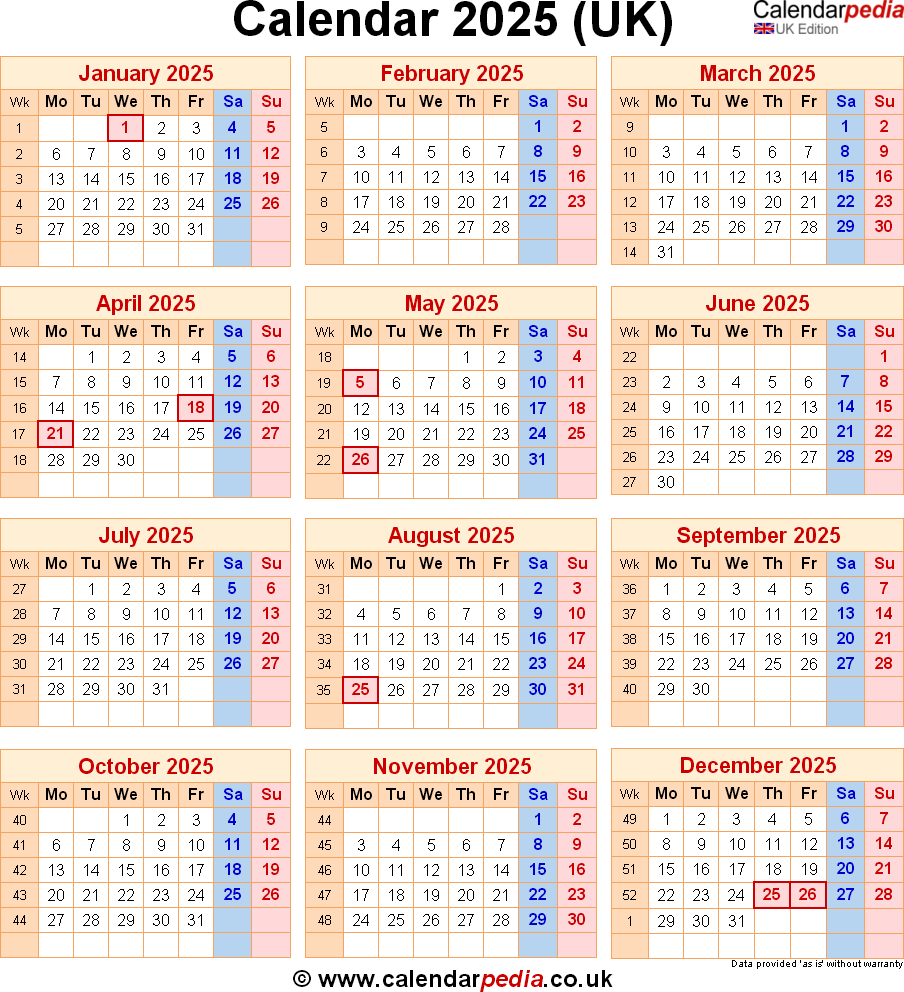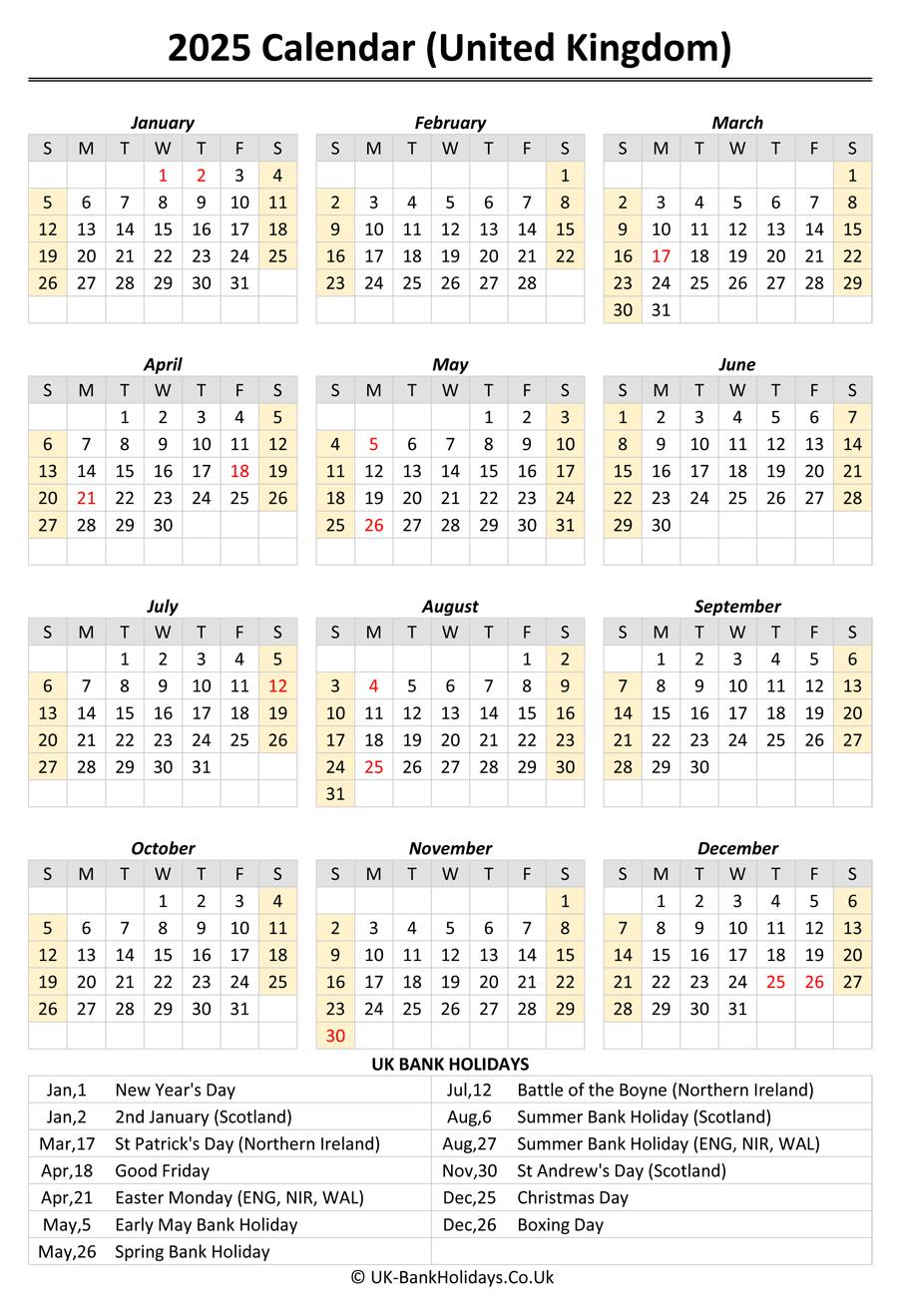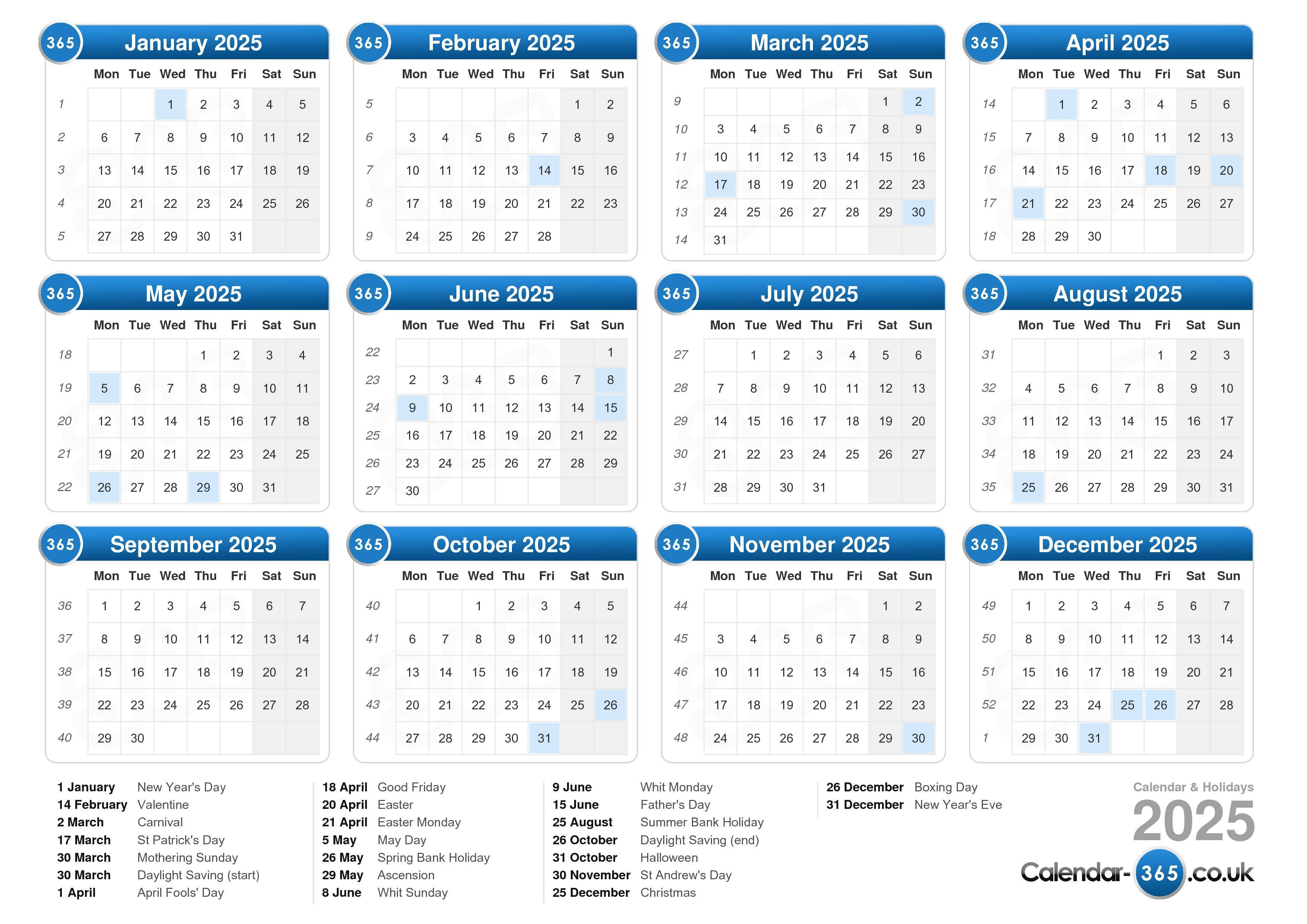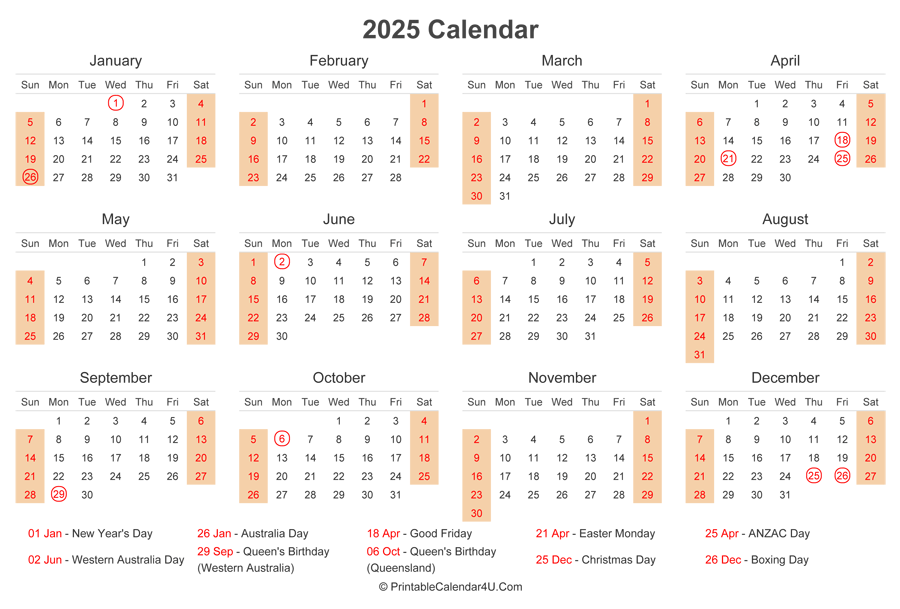Navigating the Festive Landscape: A Comprehensive Guide to UK Holidays in 2025
Related Articles: Navigating the Festive Landscape: A Comprehensive Guide to UK Holidays in 2025
Introduction
In this auspicious occasion, we are delighted to delve into the intriguing topic related to Navigating the Festive Landscape: A Comprehensive Guide to UK Holidays in 2025. Let’s weave interesting information and offer fresh perspectives to the readers.
Table of Content
Navigating the Festive Landscape: A Comprehensive Guide to UK Holidays in 2025

The United Kingdom, with its rich tapestry of cultural traditions, observes a diverse range of holidays throughout the year. These holidays provide opportunities for reflection, celebration, and a collective sense of national identity. Understanding the dates and significance of these holidays is crucial for individuals and organizations alike, ensuring seamless planning and participation in these important events.
A Calendar of Observances:
January:
- New Year’s Day (Wednesday, January 1st): Marking the beginning of a new year, this holiday is a time for reflection, resolutions, and festivities.
- Burns Night (Wednesday, January 25th): Celebrated in honor of the Scottish poet Robert Burns, this occasion features traditional meals, poetry readings, and lively music.
February:
- Valentine’s Day (Thursday, February 14th): A day dedicated to love and affection, celebrated with gifts, romantic dinners, and expressions of endearment.
March:
- St. David’s Day (Tuesday, March 1st): A cultural celebration honoring the patron saint of Wales, marked by parades, traditional music, and the wearing of daffodils.
- Mother’s Day (Sunday, March 23rd): A day to show appreciation for mothers and maternal figures, often celebrated with gifts, cards, and special meals.
April:
- Good Friday (Friday, April 18th): A Christian holiday commemorating the crucifixion of Jesus Christ, observed with church services and reflections on sacrifice.
- Easter Monday (Monday, April 21st): A public holiday following Easter Sunday, often associated with family gatherings and egg hunts.
- St. George’s Day (Wednesday, April 23rd): Celebrating the patron saint of England, this day is marked with parades, historical reenactments, and cultural events.
May:
- Early May Bank Holiday (Monday, May 5th): A public holiday offering a long weekend, often used for travel, leisure activities, and family gatherings.
- VE Day (Friday, May 8th): Commemorating the end of World War II in Europe, this day is observed with parades, ceremonies, and reflections on the sacrifices made.
- Late May Bank Holiday (Monday, May 26th): A public holiday coinciding with the Spring Bank Holiday, providing another opportunity for leisure and relaxation.
June:
- Queen’s Birthday (Monday, June 2nd): This holiday, observed in honor of the reigning monarch, is a celebration of the British monarchy and its role in national life.
July:
- Summer Bank Holiday (Monday, July 28th): A public holiday marking the beginning of the summer holidays, providing a long weekend for travel and outdoor activities.
August:
- No Public Holidays: August offers a period without designated public holidays, allowing for extended summer vacations and leisure pursuits.
September:
- No Public Holidays: September, like August, lacks designated public holidays, providing a period for work and personal endeavors.
October:
- Halloween (Wednesday, October 31st): A celebration of the supernatural, marked by costumes, trick-or-treating, and themed events.
November:
- Bonfire Night (Saturday, November 2nd): A celebration commemorating the Gunpowder Plot of 1605, marked by bonfires, fireworks, and traditional treats.
- Remembrance Sunday (Sunday, November 10th): A day of remembrance for those who have died in service to their country, observed with ceremonies, poppy displays, and moments of silence.
December:
- Christmas Day (Wednesday, December 25th): A Christian holiday celebrating the birth of Jesus Christ, marked by family gatherings, festive meals, and gift-giving.
- Boxing Day (Thursday, December 26th): A public holiday following Christmas Day, traditionally a day for giving gifts to service workers and enjoying festive traditions.
Understanding the Significance:
These holidays hold deep historical, cultural, and religious significance, shaping the identity and traditions of the United Kingdom. They provide opportunities for individuals and communities to:
- Celebrate Cultural Heritage: Many holidays, like St. David’s Day or St. George’s Day, are dedicated to celebrating the unique cultural heritage and identity of specific regions within the UK.
- Reflect on History: Holidays like VE Day and Remembrance Sunday offer moments for reflection on pivotal events in the nation’s history, honoring those who have served and sacrificed.
- Strengthen Family Ties: Holidays like Christmas and Easter provide opportunities for families to gather, share traditions, and strengthen bonds.
- Promote Community Spirit: Many holidays, like Bonfire Night or Halloween, foster a sense of community by bringing people together for shared experiences and festivities.
Impact on Business and Daily Life:
The observance of these holidays can significantly impact business operations and daily life in the UK. Understanding the implications is crucial for effective planning and management.
- Business Closures: Many businesses and organizations operate on reduced hours or close entirely during public holidays, requiring adjustments to work schedules and service availability.
- Travel Disruptions: Public holidays often lead to increased travel demand, potentially causing delays and disruptions in transportation services.
- Shift in Consumer Behavior: Holidays influence consumer spending patterns, with increased demand for specific goods and services related to festive celebrations.
Frequently Asked Questions:
Q: Are all public holidays in the UK mandatory for businesses to close?
A: While most public holidays are observed as non-working days, businesses are not legally obligated to close. However, many choose to do so to allow employees to celebrate and enjoy the holiday.
Q: How do holidays affect government services and operations?
A: Many government services, including postal services and public institutions, operate on reduced hours or close entirely during public holidays.
Q: Are there any exceptions to the standard holiday dates?
A: The dates of some holidays, like Easter and Queen’s Birthday, are determined by lunar or religious calendars and can vary slightly from year to year.
Tips for Effective Planning:
- Stay Informed: Consult reliable sources, such as government websites and news outlets, for the most up-to-date information on holiday dates and observations.
- Plan Ahead: Anticipate potential impacts on business operations, travel plans, and personal schedules.
- Communicate Effectively: Inform employees, customers, and stakeholders about any changes in operations or service availability due to holidays.
- Respect Cultural Diversity: Be mindful of the diverse cultural backgrounds and traditions within the UK, ensuring inclusivity and sensitivity in holiday celebrations.
Conclusion:
The UK’s calendar of holidays is a vibrant reflection of its rich history, diverse cultures, and shared traditions. Understanding the dates and significance of these holidays is essential for individuals and organizations alike, enabling effective planning and participation in these important events. By navigating the festive landscape with awareness and sensitivity, we can embrace the opportunities for celebration, reflection, and community building that these holidays offer.








Closure
Thus, we hope this article has provided valuable insights into Navigating the Festive Landscape: A Comprehensive Guide to UK Holidays in 2025. We hope you find this article informative and beneficial. See you in our next article!
